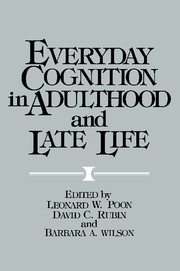Book contents
- Frontmatter
- Contents
- List of contributors
- Preface
- Part I Adult cognitive abilities in the laboratory and in real-life settings: Basic theoretical and methodological issues
- Part IA Systematic approaches to laboratory and real-world research
- Part IB Combining laboratory and real-world research
- Part II Cognition in adulthood and late life: Findings in real-life settings
- Part IIA Everyday cognitive abilities
- Part IIB Concomitant influences
- 21 Motivation and aging
- 22 Questionnaire research on metamemory and aging: Issues of structure and function
- 23 The importance of awareness in memory aging
- 24 Age and expertise: Responding to Talland's challenge
- 25 World-knowledge systems
- 26 Comments on aging memory and its everyday operations
- Part III Cognitive enhancement and aging: Clinical and educational applications
- Part IIIA Issues and perspectives
- Part IIIB Enhancement approaches
- Part IIIC Designing programs for cognitive rehabilitation
- Subject index
- Author index
23 - The importance of awareness in memory aging
Published online by Cambridge University Press: 05 October 2013
- Frontmatter
- Contents
- List of contributors
- Preface
- Part I Adult cognitive abilities in the laboratory and in real-life settings: Basic theoretical and methodological issues
- Part IA Systematic approaches to laboratory and real-world research
- Part IB Combining laboratory and real-world research
- Part II Cognition in adulthood and late life: Findings in real-life settings
- Part IIA Everyday cognitive abilities
- Part IIB Concomitant influences
- 21 Motivation and aging
- 22 Questionnaire research on metamemory and aging: Issues of structure and function
- 23 The importance of awareness in memory aging
- 24 Age and expertise: Responding to Talland's challenge
- 25 World-knowledge systems
- 26 Comments on aging memory and its everyday operations
- Part III Cognitive enhancement and aging: Clinical and educational applications
- Part IIIA Issues and perspectives
- Part IIIB Enhancement approaches
- Part IIIC Designing programs for cognitive rehabilitation
- Subject index
- Author index
Summary
It's seven o'clock. The incessant chirping of the alarm rudely jolts you out of blissful slumber. In a seemingly reflex reaction, you grope around and silence the offender. Lying in the comfort of your bed, dreading the shock of cold floors, you begin to think. Even in your semiconscious state, you start remembering what the new day has in store: three committee meetings, class, several errands to run, a paper to write, a dentist appointment, and a very special dinner date. With a solemn promise to yourself that you won't (meaning can't) forget any of them, you finally get up and charge into the safety of a nice hot shower. During the day, you check the clock from time to time, talk to yourself about when the next appointment is, look at your calendar, and so on.
Embedded in these typical, everyday activities is a very intriguing notion: that we are aware that we need to remember things, that we tell ourselves to remember, and that we periodically check to see how we are doing. That awareness and memory are inextricably linked (Tulving, 1985) is obvious in everyday life. Unfortunately, it seems that memory researchers have been reluctant to recognize that fact (Hilgard, 1980; Miller, 1980; Neisser, 1979; Tulving, 1985). The goal of this chapter is to address this lack of concern, because the role of awareness in memory provides insights into memory development across adulthood.
- Type
- Chapter
- Information
- Everyday Cognition in Adulthood and Late Life , pp. 416 - 436Publisher: Cambridge University PressPrint publication year: 1989
- 23
- Cited by



